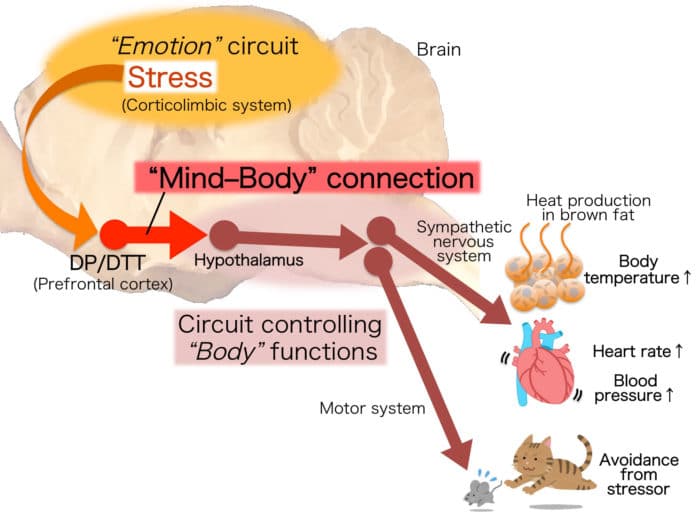Emotional stress initiates the sympathetic nervous system, adversely affects their wellbeing. Excessive stress may cause symptoms such as psychogenic fever, a condition of abnormally high body temperature.
To develop strategies for treating stress-induced symptoms, the neural mechanism underlying physical responses to stress had first to be comprehended.
To this end, scientists at Nagoya University have discovered a neural circuit that drives physical responses to emotional stress. The circuit starts in deep brain regions, called the dorsal peduncular cortex and the dorsal tenia tecta (DP/DTT), that impart stress signals to the hypothalamus, a small region in the brain that controls the body’s vital functions.
To find out the mechanism, scientists had to inject tracers into the brains of a group of rats, and the rats were subjected to a stressful event (rat bullying by a dominant rat).
The tracers showed that mainly the DP/DTT brain areas were highly active when exposed to stress.
Scientists also examined the role these brain areas in stress response by impairing the areas’ connections to the hypothalamus and again exposed the rats to the same stress. Now the rats did not exhibit any stress-induced physical response, neither a rise in blood pressure nor body temperature nor a faster heart rate.
This study demonstrates that the DP/DTT areas together are responsible for sending stress signals to the hypothalamus, and thus that blocking the DP/DTT-to-hypothalamus circuit can result in a reduction of stress symptoms in rats.
Professor Nakamura sums up the research result like this: “The DP/DTT are parts of the brain that are involved in processing emotion and stress. The DP/DTT-to-hypothalamus pathway we discovered, therefore, represents a brain mechanism for a ‘mind-body connection,’ which can be a potential target for treating stress-related disorders such as panic disorder, post-traumatic stress disorder (PTSD), and psychogenic fever.”
Journal Reference:
- Naoya Kataoka, A central master driver of psychosocial stress responses in the rat. DOI: 10.1126/science.aaz4639
